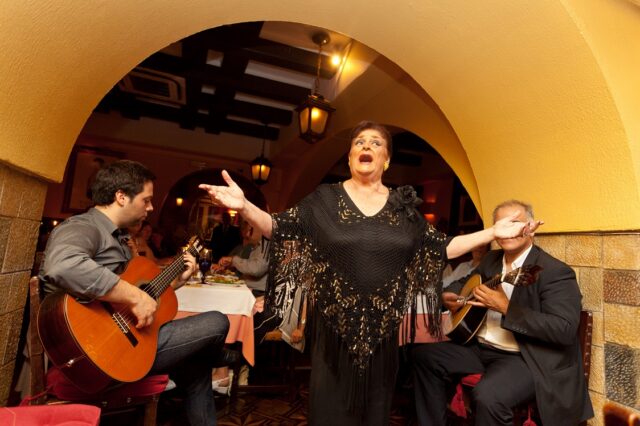“O waves of the salty sea, where do you get your salt? From the tears shed by the women in black on the sad shores of Portugal.”
Because of the coronavirus, Europe is effectively off-limits to American travelers for the next few weeks (and likely longer). But travel dreams are immune to any virus. During these challenging times, I believe a daily dose of travel dreaming can actually be good medicine. Here’s another one of my very favorite travel dreams-come-true…a reminder of what’s waiting for you in Europe on the other end of this crisis.

It’s after dark in Lisbon’s ramshackle Alfama neighborhood. Old-timers gather in restaurants, which serve little more than grilled sardines, to hear and sing Portugal’s mournful fado: traditional ballads of lament.
I grab the last chair in a tiny place, next to two bearded men hunched over their mandolins, lost in their music. A bald singer croons, looking like an old turtle without a shell. There’s not a complete set of teeth in the house. A spry grandma does a little jive, balancing a wine bottle on her head. The kitchen staff peers from a steaming hole in the wall, backlit by their flaming grill. The waiter sets a plate of fish and a pitcher of cheap cask wine on my table and — like a Portuguese Ed Sullivan — proudly introduces the next singer, a woman who’s been singing here for more than 50 years.
She’s the star: blood-red lipstick, big hair, a mourning shawl over her black dress. Towering above me, flanked by those mandolins, she’s a fusion of moods — old and young, both sad and sexy. Her revealing neckline promises there’s life after death. I can smell her breath as she drowns out the sizzle of sardines with her plush voice.
The man next to me whispers in my ear a rough English translation of the words she sings. It’s a quintessential fado theme of lost sailors and sad widows: “O waves of the salty sea, where do you get your salt? From the tears shed by the women in black on the sad shores of Portugal.” Suddenly it’s surround-sound as the diners burst into song, joining the chorus.
Fado is the folk music of Lisbon’s rustic neighborhoods: so accessible to anyone willing to be out late and stroll the back streets. Since the mid-1800s, it’s been the Lisbon blues — mournfully beautiful and haunting ballads about long-gone sailors, broken hearts, and bittersweet romance. Fado means “fate” — how fate deals with Portugal’s adventurers… and the families they leave behind. The lyrics reflect the pining for a loved one across the water, hopes for a future reunion, remembrances of a rosy past, or dreams of a better future. It’s the yearning for what might have been if fate had not intervened. While generally sad, fado can be jaunty…in a nostalgic way.
The songs are often in a minor key. The singer (fadista) is accompanied by stringed instruments, including a 12-string guitarra portuguesa with a round body like a mandolin (or, as the man whispering in my ear said, “like a woman”). Fado singers typically crescendo into the first word of the verse, like a moan emerging from deep inside. Though the songs are often sorrowful, the singers rarely overact — they plant themselves firmly and sing stoically in the face of fate.
While fado has become one of Lisbon’s favorite late-night tourist traps, I can still find funky bars — without the high prices and big-bus tour groups — that feel very local. Two districts, the Alfama and the Bairro Alto, have small, informal fado restaurants for late dinners or even later evenings of drinks and music. Handwritten “fado tonight” (fado esta noite) signs in Portuguese are good news, but even a restaurant filled with tourists can serve up fine fado with its sardines.
After thanking the man who’d translated the songs for me, I leave the bar late that night feeling oddly uplifted. An evening seasoned with the tears of black-clad widows reminds me that life, even salty with sadness, is worth embracing.
(This story is excerpted from my upcoming book, For the Love of Europe — collecting 100 of my favorite memories from a lifetime of European travel, coming out in July. It’s available for pre-order.)